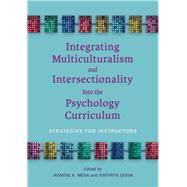Chapters examine specific sociocultural groups based on gender, ethnicity, religious beliefs, sexual orientation, and socioeconomic and ability status. Authors discuss these topics using an intersectional approach, recognizing that individuals are complex beings who are members of multiple groups and whose overlapping identities influence their development, social relationships, and worldviews. Other chapters offer recommendations for integrating multiculturalism into core psychology courses, including introduction to psychology classes, which are most undergraduate students’ only exposure to psychology.

Integrating Multiculturalism and Intersectionality Into the Psychology Curriculum Strategies for Instructors
by Mena, Jasmine A.; Quina, KathrynBuy New
Rent Textbook
Rent Digital
Used Textbook
We're Sorry
Sold Out
Summary
Chapters examine specific sociocultural groups based on gender, ethnicity, religious beliefs, sexual orientation, and socioeconomic and ability status. Authors discuss these topics using an intersectional approach, recognizing that individuals are complex beings who are members of multiple groups and whose overlapping identities influence their development, social relationships, and worldviews. Other chapters offer recommendations for integrating multiculturalism into core psychology courses, including introduction to psychology classes, which are most undergraduate students’ only exposure to psychology.
Author Biography
Kathryn (“Kat”) Quina, PhD, is Emerita Associate Dean and Professor of Psychology and Gender and Women’s Studies at the University of Rhode Island. She earned her PhD in experimental psychophysics at the University of Georgia. Her research focuses on women and gender, especially the sequelae of sexual abuse. As Psychology Coordinator and Advisor, and subsequently Associate Dean, of the University of Rhode Island's College of Continuing Education, she directed programs that enhanced minority and immigrant success in adult education. She is widely published and has received numerous awards for her work. Kat Quina lives in Hope, RI. Visit https://web.uri.edu/psychology/meet/kathryn-quina/.
Table of Contents
Contributors
Foreword
Stanley Sue
Foreword
Florence L. Denmark
Acknowledgments
Introduction
Jasmine A. Mena and Kathryn Quina
Part I: Multiculturalism and Intersectionality in the Psychology Classroom
Chapter 1: Teaching From an Intersectional Perspective: An Overview
Brittney Poindexter and Kathryn Quina
Chapter 2: Developing a Culturally Competent and Inclusive Curriculum: A Comprehensive Framework for Teaching Multicultural Psychology
Annemarie Vaccaro
Chapter 3: Racial Microaggressions and Difficult Dialogues in the Classroom
Tammy Vargas Warner
Part II: Gender, Ethnic, and Sociocultural Perspectives: Specialized Courses and Content Areas
Chapter 4: Who Is the Woman in the Psychology of Women? Addressing Diversity and Intersectionality
Beverly J. Goodwin, Camille J. Interligi, Ashley E. Kasardo, Maureen C. McHugh, and Andrea D. Poet
Chapter 5: Intersectionality in Teaching the Psychology of Men
Christopher Kilmartin
Chapter 6: Integrating Lesbian, Gay, Bisexual, Transgender, and Queer Issues in the Psychology Curriculum
Jacqueline S. Weinstock
Chapter 7: Psychology of Asian Americans
Connie S. Chan and Kattalina Berriochoa
Chapter 8: Teaching Africana Psychology
Lisa Whitten, Halford H. Fairchild, and Harriette W. Richard
Chapter 9: Teaching Latinx Psychology
Jasmine A. Mena and Melba J. T. Vásquez
Chapter 10: Weaving American Indian and Alaska Native Topics Into the Psychology Curriculum
Joseph E. Trimble and Gayle Skawen:nio Morse
Chapter 11: Intersections Among Religion, Culture, Gender, and Mental Health
Kate Miriam Loewenthal
Chapter 12: Disability as an Intersectional Diversity Variable in the Psychology Curriculum
Julie L. Williams
Chapter 13: Teaching About Poverty and Social Class: Fostering Class Consciousness
Heather E. Bullock and Bernice Lott
Chapter 14: Teaching Cultural and Transnational Psychology: Taking Intersectionality Across the Globe
Lynn H. Collins
Chapter 15: Nontraditional Students: Multigenerational, Multilocational, and Multicultural
Mary Zahm and Kathryn Quina
Part III: Integrating Diversity Into General Psychology Courses
Chapter 16: The Introductory Psychology Course From a More Diverse Human Perspective
Su L. Boatright-Horowitz, Savannah McSheffrey, Marisa E. Marraccini, and Yvette Harps-Logan
Chapter 17: Teaching Personality and Abnormal Psychology With Inclusivity
Alice W. Cheng, Kathy McCloskey, and Mala L. Matacin
Chapter 18: Teaching Developmental Psychology: Celebrating the Dialectics of Development
Kathleen S. Gorman and Celeste M. Caviness
Chapter 19: Overcoming Student Defensiveness in Social Psychology Courses: A Collaborative Workshop for Discussing Privilege and Prejudice
Andrea L. Dottolo
Chapter 20: Multicultural Considerations in the Psychology Research Methods Course
Jasmine A. Mena, Nathan E. Cook, and Kathryn Quina
Chapter 21: Teaching Biopsychology: Multicultural Findings and Implications
Lisa Weyandt, Danielle R. Oster, Bergljot Gyda Gudmundsdottir, and Meghan Lamarre Rinaldi-Young
Chapter 22: Teaching Critical, Multivocal Histories of Psychology: Uncovering Diversity
Kelli Vaughn-Johnson and Alexandra Rutherford
Chapter 23: Including Social Determinants of Health Disparities in Health Psychology
Colleen A. Redding and Miryam Yusufov
Chapter 24: Diversity Education in Professional Psychology
Kathleen A. Malloy, Julie L. Williams, LaTrelle D. Jackson, Janeece R. Warfield, and Steven Kniffley
Index
About the Editors
An electronic version of this book is available through VitalSource.
This book is viewable on PC, Mac, iPhone, iPad, iPod Touch, and most smartphones.
By purchasing, you will be able to view this book online, as well as download it, for the chosen number of days.
Digital License
You are licensing a digital product for a set duration. Durations are set forth in the product description, with "Lifetime" typically meaning five (5) years of online access and permanent download to a supported device. All licenses are non-transferable.
More details can be found here.
A downloadable version of this book is available through the eCampus Reader or compatible Adobe readers.
Applications are available on iOS, Android, PC, Mac, and Windows Mobile platforms.
Please view the compatibility matrix prior to purchase.
